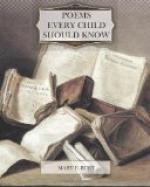While the pleasant dews are falling;—
The new-milch heifer is quick and shy,
But the old cow waits with tranquil eye;
And the white stream into the bright pail flows,
When to her task the milkmaid goes,
Soothingly calling,—
“So, boss! so, boss! so! so! so!”
The cheerful milkmaid takes her stool,
And sits and milks in the twilight cool,
Saying, “So! so, boss! so! so!”
To supper at last the farmer
goes.
The apples are pared, the
paper read,
The stories are told, then
all to bed.
Without, the crickets’
ceaseless song
Makes shrill the silence all
night long;
The
heavy dews are falling.
The housewife’s hand
has turned the lock;
Drowsily ticks the kitchen
clock;
The household sinks to deep
repose;
But still in sleep the farm-boy
goes.
Singing,
calling,—
“Co’, boss!
co’, boss! co’! co’! co’!”
And oft the milkmaid, in her
dreams,
Drums in the pail with the
flashing streams,
Murmuring, “So,
boss! so!”
J.T. TROWBRIDGE.
TO A MOUSE,
ON TURNING UP HER NEST WITH THE PLOW, NOVEMBER, 1785
“To a Mouse” and “To a Mountain
Daisy,” by Robert Burns (1759-96), are the
ineffable touches of tenderness that illumine the sturdy
plowman.
The contrast between the strong man and the
delicate flower or creature at his mercy makes tenderness
in man a vital point in character.
The lines “To a Mouse” seem by report to have been composed while Burns was actually plowing. One of the poet’s first editors wrote: “John Blane, who had acted as gaudsman to Burns, and who lived sixty years afterward, had a distinct recollection of the turning up of the mouse. Like a thoughtless youth as he was, he ran after the creature to kill it, but was checked and recalled by his master, who he observed became thereafter thoughtful and abstracted. Burns, who treated his servants with the familiarity of fellow-labourers, soon afterward read the poem to Blane.”
Wee, sleekit, cow’rin’,
tim’rous beastie,
Oh, what a panic’s in
thy breastie!
Thou needna start awa’
sae hasty,
Wi’
bickering brattle!
I wad be laith to rin and
chase thee,
Wi’
murd’ring pattle!
I’m truly sorry man’s
dominion
Has broken Nature’s social union,
And justifies that ill opinion,
Which makes thee startle
At me, thy poor earth-born companion
And fellow-mortal!
I doubtna, whiles, but thou may
thieve;
What then? poor beastie, thou maun live!
A daimen icker in a thrave
‘S a sma’ request:
I’ll get a blessin’ wi’ the
lave,
And never miss ’t!
Thy wee bit housie, too, in ruin!
Its silly wa’s the win’s are strewin’!
And naething now to big a new ane
O’ foggage green,
And bleak December’s winds ensuin’,
Baith snell and keen!




